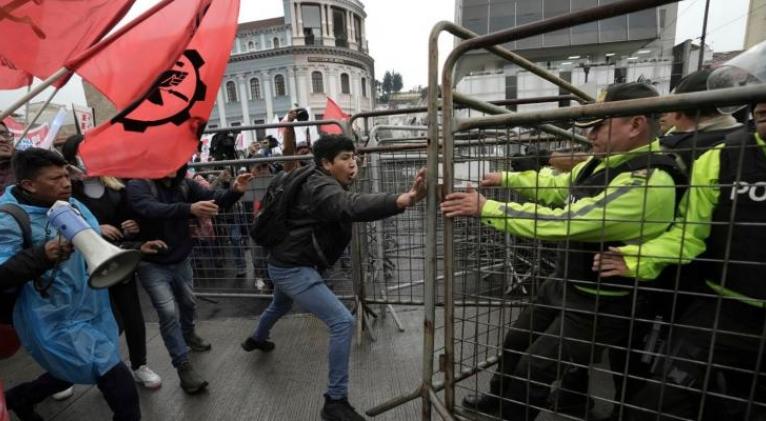Ecuador: History Repeating Itself?
especiales

A few months before the presidential elections in Ecuador, there are already 16 candidates for power involved in the two previous occasions with the same right-wing tactic of dividing and even taking advantage of hatred and rivalries to win, despite not having popular support.
It seems illogical, but it’s so, when the reaction unites the majority of the like-minded candidates defeated in the first round and achieves the support of the main supposedly progressive block defeated to make its candidate prevail, an entity at the service of the oligarchy and neoliberalism.
This happened with banker Guillermo Lasso, who “convinced” the indigenous candidate of Pachacutik, Yaku Pérez, to face and defeat the candidate of the Correa-follower Citizen Revolution, winner of the first stage.
After Lasso was ousted in the middle of his term, something similar occurred with the elections that empowered the current president, the multimillionaire Daniel Noboa, although using from the first moment the broad spectrum of the right to defeat the candidate of Correa-follower again.
Recent polls reveal that among the multitude of candidates, whose number may increase, the Correa candidate Verónica González stands out in first place, followed by Noboa and the Pachacutik candidate, engineer Leonardo Iza, who, unlike Yaku Pérez, has principles and prestige that are still permanent.
Both Correísmo and the indigenous movement are left-wing groups, with programs that are more accessible to the people, in the midst of the turbulence that Daniel Noboa inherited and worsened.
The country is experiencing an epidemic of violence, motivated partly by the vertiginous increase in drug trafficking. Traditionally a transit route for cocaine to the United States, in recent years it has shifted into a distribution center where cartels from Colombia and Mexico have moved, as well as local groups. Prisons are burning, while the government has opened the doors to the United States military and intelligence groups to intervene in the country.
In the midst of this, the unity of progressive groups is necessary to defeat the reaction, but this is not evident in the considerations of their top leaders, former President Rafael Correa, on the one hand, and on the other hand, Leonardo Iza, president of the Confederation of Indigenous Nationalities of Ecuador (CONAIE).
BUT…
The differences between Correa and Iza stand out the complexity and diversity within the left-wing political spectrum in Ecuador, especially at a critical time of preparation for the upcoming elections. While Iza seeks to consolidate a broad alliance of leftist forces, Correa seems to prefer a tactic more focused on the identity and principles of his movement.
Correa recently expressed his opinions regarding a possible option proposed by Iza, who proposes the creation of a left-wing front that includes various political organizations, including the Citizen Revolution. However, I repeat, Correa has shown objections regarding this initiative.
In an interview with Radio Sonorama, the former president expressed his personal respect for the indigenous leader, but noted that Iza “clearly has limitations and biases.” Correa criticized Iza’s proposal for its exclusionary approach, as it suggests that the political alliance be made only with left-wing parties and groups, without considering other political forces.
“We respect the differences, but we will not form a coalition with other parties just to gain additional points,” Correa said during the interview. These statements underline the position of the former president, who seems to be leaning towards a more autonomous political strategy and less dependent on broad coalitions.
In turn, Iza considered that if a political sector defines itself as left-wing, it must respect the diversities that also identify themselves as left-wing. There are several issues:
The first is that “Correa accused us at CONAIE of being terrorists and servile to the CIA, among other nonsense. Then there were concrete problems, such as Correa's opposition to intercultural education and his discourse towards diversities. Third issue: his period has been the most intense regarding the increase in mining in our territories. There was an imposition of extractivist politics and we went out to defend our territories. Then his government entered into a more acute confrontation with CONAIE when it tried to take away our headquarters. There was also an attempt to divide the organizations through the Undersecretariat of Peoples and Nationalities.”
However, he acknowledged that “Correa has an important political presence in Ecuador; Whether positive or negative, he is at the heart of decisions.
“But we cannot continue living off of Correa-followers and anti-Correa. Only the right benefits from that,” he acknowledged, and then considered that in his country there’s a crisis of representation, where political actors are delegitimized.
“People have not benefited from politics in recent years. They don’t want to know anything. But with that we don’t resolve the crisis. So, in the face of the crisis, we cannot turn to anarchist scenarios, which could end up in a more difficult situation. We want to lead from our basic organizations. The National Assembly is worn out. The executive is worn out. The Police is also worn out right now. Virtually all the State institutions have legitimacy problems. But, nevertheless, it’s still the Assembly that represents a balance in the executive’s decisions. There were perverse laws that were stopped,” he considered.














Add new comment